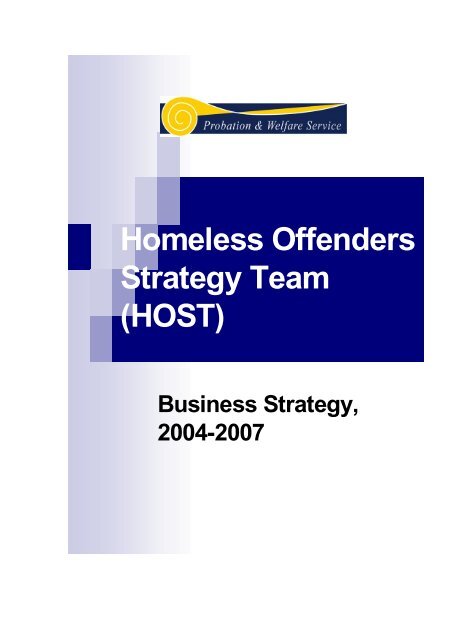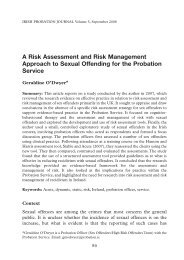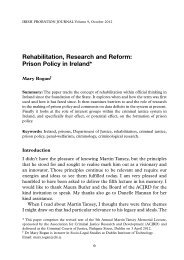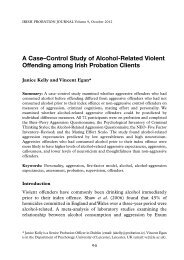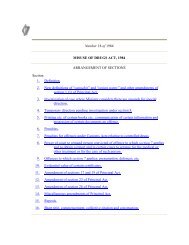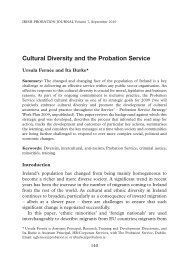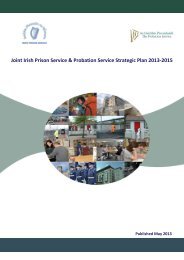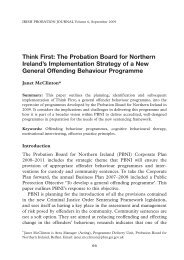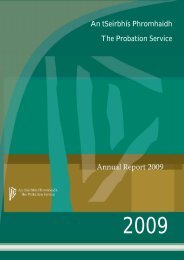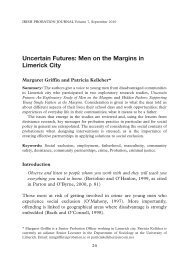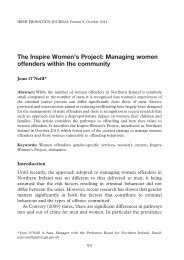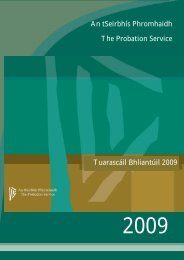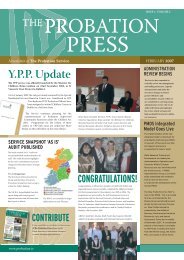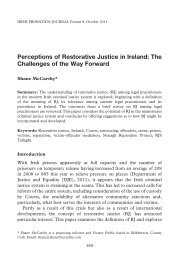Homeless Offenders Strategy Team (HOST) - The Probation Service
Homeless Offenders Strategy Team (HOST) - The Probation Service
Homeless Offenders Strategy Team (HOST) - The Probation Service
You also want an ePaper? Increase the reach of your titles
YUMPU automatically turns print PDFs into web optimized ePapers that Google loves.
<strong>Homeless</strong> <strong>Offenders</strong><br />
<strong>Strategy</strong> <strong>Team</strong><br />
(<strong>HOST</strong>)<br />
Business <strong>Strategy</strong>,<br />
2004-2007
<strong>HOST</strong> Business <strong>Strategy</strong> 2004-2007<br />
Preface<br />
Secure and stable accommodation is recognised as a significant protective<br />
factor in work to reduce re-offending and contribute to crime-free<br />
lifestyles. <strong>The</strong> corollary of this is that where an offender is homeless, as<br />
well as being a risk factor in itself, the lack of appropriate<br />
accommodation interacts with other factors to multiply the risk of that<br />
person re-offending.<br />
Although the <strong>Probation</strong> & Welfare <strong>Service</strong> (PWS) is not itself a direct<br />
accommodation provider, it has a long and continuing history of working<br />
in partnership with a range of statutory and non-governmental<br />
organizations involved in accommodation provision for offenders. In this<br />
respect, the <strong>Service</strong> brings its commitment and expertise in addressing<br />
offending behaviour and to the management and integration of offenders<br />
in the community to its work in this field.<br />
<strong>The</strong> <strong>Homeless</strong> <strong>Offenders</strong> <strong>Strategy</strong> <strong>Team</strong> (<strong>HOST</strong>) was established in 2002,<br />
on foot of the government’s <strong>Homeless</strong> Strategies published in 2000 and<br />
2002. <strong>The</strong> <strong>Team</strong> is multi-agency in nature, with the PWS as the lead<br />
agency. Dublin City Council has seconded a senior official to work in<br />
<strong>HOST</strong> on a fulltime basis. This arrangement has already proven to be<br />
extremely valuable. <strong>The</strong> <strong>Team</strong> has also forged excellent liaison<br />
arrangements with the Irish Prison <strong>Service</strong> (IPS), and the Regimes<br />
Directorate in particular. We are also seeking to build on the already<br />
effective, flexible and practical working relations with local prison<br />
managements.<br />
<strong>HOST</strong> is a relatively small unit (see Section 2: Introduction and<br />
Background) with a mainly strategic focus. <strong>The</strong> <strong>Team</strong> has a national<br />
remit and as the range and pattern of organisations and structures<br />
impacting on homelessness and offenders’ accommodation issues is<br />
complex, the task of co-ordinating effective responses poses significant<br />
challenges. <strong>The</strong>re is a clear need to add value to existing services, rather<br />
than replace or duplicate them. Generally, the role of <strong>HOST</strong> is in<br />
promoting measures to prevent offender homelessness and ensuring<br />
offenders have access to appropriate accommodation and services. To this<br />
end, <strong>HOST</strong> and the PWS work with local authorities, health boards and<br />
voluntary bodies and others to facilitate these aims, and to ensure that the<br />
work of the PWS contributes strategically at all levels to minimising<br />
offender homelessness and its impact on offending.<br />
1
<strong>HOST</strong> Business <strong>Strategy</strong> 2004-2007<br />
I would like to thank all those (both within and outside the PWS) who<br />
contributed to the formulation of this Strategic Plan. It is intended that the<br />
strategy will provide a ‘living’ and working guide for the PWS and its<br />
partner agencies over the coming years in the work to improve offender<br />
accommodation and reduce offending.<br />
Vivian Geiran, Assistant Principal <strong>Probation</strong> & Welfare Officer<br />
Director, <strong>Homeless</strong> <strong>Offenders</strong> <strong>Strategy</strong> <strong>Team</strong> (<strong>HOST</strong>)<br />
April 2004<br />
2
<strong>HOST</strong> Business <strong>Strategy</strong> 2004-2007<br />
Abbreviations Used:<br />
CDTH<br />
COGOI<br />
CSER<br />
DIT<br />
DJELR<br />
DOE<br />
ERHA<br />
<strong>HOST</strong><br />
IPS<br />
IT<br />
LA<br />
NESF<br />
PSM<br />
PSR<br />
PWS<br />
Cross-Department <strong>Team</strong> on <strong>Homeless</strong>ness<br />
Co-ordinating Group on Offender Integration<br />
Centre for Social & Educational Research<br />
Dublin Institute of Technology<br />
Department of Justice, Equality & Law Reform<br />
Department of Environment, Heritage & Local Government<br />
Eastern Regional Health Authority<br />
<strong>Homeless</strong> <strong>Offenders</strong> <strong>Strategy</strong> <strong>Team</strong><br />
Irish Prison <strong>Service</strong><br />
Information Technology<br />
Local Authority<br />
National Economic and Social Forum<br />
Positive Sentence Management<br />
Pre-Sanction Report<br />
<strong>Probation</strong> & Welfare <strong>Service</strong><br />
3
<strong>HOST</strong> Business <strong>Strategy</strong> 2004-2007<br />
Contents<br />
Page<br />
Section 1 H.O.S.T. Mission Statement 5<br />
Section 2 Introduction and Background 6<br />
Section 3 Principles underpinning the <strong>Strategy</strong> 12<br />
Section 4 Strategic Aims and Objectives 14<br />
Section 6 Financial Requirements 25<br />
Section 7 Implementation and Monitoring Progress 26<br />
Appendix 27<br />
4
<strong>HOST</strong> Business <strong>Strategy</strong> 2004-2007<br />
Section 1<br />
<strong>Homeless</strong> <strong>Offenders</strong> <strong>Strategy</strong> <strong>Team</strong><br />
(<strong>HOST</strong>)<br />
Mission Statement<br />
To prevent and minimise homelessness<br />
among offenders by working in effective<br />
partnership with statutory and nonstatutory<br />
bodies, thus contributing to<br />
reducing re-offending, promoting<br />
community safety and social inclusion.<br />
5
<strong>HOST</strong> Business <strong>Strategy</strong> 2004-2007<br />
Section 2<br />
Introduction and Background<br />
<strong>The</strong>re is a variety of routes by which people may become homeless.<br />
While links between a range of variables and homelessness have been<br />
established, there is little if any agreement on causality. Poverty, history<br />
of substitute care, experience of abuse or neglect, family conflict, age at<br />
first becoming homeless, social isolation, substance misuse, mental ill<br />
health and imprisonment are significant factors that can contribute to a<br />
person becoming homeless. <strong>The</strong> relationship between crime and<br />
homelessness is also complex. For those who come in contact with the<br />
criminal justice system through their offending, that contact and<br />
especially incarceration at any point in a person’s life, can increase the<br />
likelihood of their becoming homeless. 1 A significant percentage of<br />
offenders are already homeless or at risk of homelessness at the point of<br />
contact with criminal justice agencies, including at the point of<br />
incarceration. It is also recognised that homelessness in itself can be an<br />
element in a compound of social factors which may contribute to<br />
offending. Many homeless people have contact with the criminal justice<br />
system, often for a succession of relatively minor offences. <strong>The</strong>y may<br />
also have other problems such as substance misuse and mental health<br />
difficulties, which are likely to place them at increased risk of further<br />
offending and homelessness. Offending behaviour may thus both result<br />
from and contribute to homelessness.<br />
<strong>The</strong>re is evidence that being discharged from prison can be one of the<br />
triggers leading to homelessness. Carlisle’s (1996) 2 findings indicated<br />
that 40% of a sample of prisoners expected to be homeless on release,<br />
while less than 50% reported being able to return to the accommodation<br />
they had prior to imprisonment. Paylor (1992) 3 had also documented<br />
similar findings: 40% of that sample were homeless on discharge from<br />
1 For example, see Carlen, P. (1983) Women’s Imprisonment London: Routledge;<br />
Piliavin, I., Sosin, M., Westerfelt, A. and Matsueda, R. (1993) ‘<strong>The</strong> Duration of<br />
<strong>Homeless</strong> Careers – An Exploratory Study,’ Social <strong>Service</strong> Review, 67 (4), 576-598<br />
and Yanetta, A., Third, H. and Anderson, A. (1999) National Monitoring and Interim<br />
Evaluation of the Rough Sleepers Initiative in Scotland, Edinburgh: Scottish<br />
Executive Central Research Unit.<br />
2 Carlisle, J. (1996) <strong>The</strong> Housing Needs of Ex-Prisoners, Centre for Housing Policy,<br />
University of York.<br />
3 Paylor, I. (1992) <strong>Homeless</strong>ness and Ex-<strong>Offenders</strong>: A Case for Reform, University of<br />
East Anglia, Social Work Monographs.<br />
6
<strong>HOST</strong> Business <strong>Strategy</strong> 2004-2007<br />
custody. Access for offenders to housing can be difficult to achieve. It is<br />
often hindered by factors such as family breakdown and public<br />
antagonism. <strong>The</strong> public's concern about offenders living in their midst is<br />
easy to understand. Added to this is the destabilising effect of<br />
homelessness which increases the risk to the community. <strong>The</strong> housing<br />
needs of offenders are, however, an issue for the wider community.<br />
Research has indicated that offenders who are homeless are more likely to<br />
re-offend than those with a secure home. 4 It is, therefore, in the interest of<br />
society as a whole that both policy and practice should address the issue<br />
of providing suitable housing for offenders.<br />
Because homeless people tend to be over-represented in the criminal<br />
justice system, homelessness as a consequence impacts on all the criminal<br />
justice agencies, including the PWS and the IPS. In 2003 the PWS and<br />
the Department of Justice, Equality & Law Reform (DJELR)<br />
commissioned the Centre for Social and Educational Research (CSER) at<br />
Dublin Institute of Technology (DIT) to carry out a research project in<br />
relation to the progression of homeless offenders through the criminal<br />
justice system in Dublin. This major project (unpublished at the time of<br />
writing) will add much to the existing knowledge base. It found inter alia<br />
that:<br />
• Almost one in ten of those offenders referred to the PWS by<br />
the courts in Dublin were homeless on referral.<br />
• Of these, almost half were women.<br />
• A little over half of those surveyed in custody had<br />
experienced homelessness at least once prior to committal.<br />
• A quarter of the overall incarcerated sample was homeless<br />
on committal.<br />
• A third of the women in custody were homeless on<br />
committal to prison.<br />
• <strong>Homeless</strong> offenders were most likely to be single, male and<br />
under thirty years of age.<br />
• Significant substance misuse and mental health issues<br />
emerged in the research sample.<br />
• Those surveyed also reported high prevalence of youth<br />
homelessness and multiple incidences of homelessness.<br />
4 For example, see Banks, C. and Fairhead, S. (1976) <strong>The</strong> Petty Short-Term Offender,<br />
Barry Rose; and Ramsay, M. (1986) A Review of Research into <strong>Homeless</strong>ness and<br />
Offending, Home Office Research Bulletin No. 20, London: Home Office.<br />
7
<strong>HOST</strong> Business <strong>Strategy</strong> 2004-2007<br />
<strong>The</strong> research also highlighted the implications for the work of the PWS in<br />
offender supervision and integration in the community caused by<br />
homelessness and related issues. <strong>The</strong>se include the difficulties in:<br />
tracking offenders who are homeless and living in transitory or temporary<br />
accommodation, the often disproportionate amount of time spent by<br />
probation officers addressing crises caused by homelessness, finding<br />
accommodation for people who often present with challenging behaviour<br />
(as well as compounding issues such as mental illness, substance misuse<br />
and so on) and who may be stigmatised by the nature of their offending<br />
(e.g. sexual violence). <strong>Homeless</strong>ness also makes compliance with<br />
supervised community sanctions, such as probation or community<br />
service, more difficult for the service user. At the same time, it is<br />
generally in the interests of the offender and society as a whole, to make<br />
community based sanctions as available as is practicable to homeless<br />
offenders. Custodial options, while necessary in a proportion of cases,<br />
can serve to make integration of the homeless offender ultimately more<br />
difficult. A clear implication for the PWS is the need to maximize<br />
partnership working to address such complex problems as offending and<br />
homelessness and facilitate offender access to mainstream services. For<br />
those who do have custodial penalties imposed, the implementation by<br />
the IPS of an advanced system of Positive Sentence Management should<br />
contribute significantly to planning for and implementing prisoner<br />
reintegration more effectively.<br />
Over the course of recent years the government has formulated a strategy<br />
to develop a comprehensive response to homelessness, incorporating the<br />
broad spectrum of matters relating to this issue including accommodation,<br />
health and welfare, education, training and preventative measures. This<br />
strategy is set out primarily in the three documents; <strong>Homeless</strong>ness - An<br />
Integrated <strong>Strategy</strong> (2000), Youth <strong>Homeless</strong> <strong>Strategy</strong> (2001) and the<br />
<strong>Homeless</strong> Preventative <strong>Strategy</strong> (2002). <strong>The</strong> response of the <strong>Probation</strong><br />
and Welfare <strong>Service</strong> to homelessness and related issues, as they impact<br />
on offenders and the wider community, is fundamentally informed and<br />
founded on these three strategies, in conjunction with the mission,<br />
strategies and business plans of the <strong>Service</strong> itself, those of the Department<br />
of Justice, Equality and Law Reform and the Irish Prison <strong>Service</strong>. <strong>The</strong><br />
<strong>Homeless</strong> <strong>Offenders</strong> <strong>Strategy</strong> <strong>Team</strong> (<strong>HOST</strong>) was established following<br />
publication of the <strong>Homeless</strong> Preventative <strong>Strategy</strong> with the purpose of<br />
assisting homeless offenders. <strong>The</strong> National Economic & Social Forum<br />
(NESF) Report on the Re-Integration of Prisoners (2002) has also made<br />
an important contribution to the approach taken in this area of work.<br />
8
<strong>HOST</strong> Business <strong>Strategy</strong> 2004-2007<br />
Developments to date<br />
Since the establishment of <strong>HOST</strong>, progress has been made on a number<br />
of fronts, including the following:<br />
Sanction was secured by the Department of Justice, Equality & Law<br />
Reform in 2002 for four dedicated PWS personnel for <strong>HOST</strong> as follows:<br />
• 1 x APPWO (Director)<br />
• 1 x SPWO<br />
• 1 x Executive Officer<br />
• 1 x Clerical Officer<br />
Appropriate personnel have been assigned to the above positions. It was<br />
anticipated that additional specialist personnel would be seconded to the<br />
unit from DCC and the IPS. A Senior Official from DCC has been<br />
seconded (with the co-operation and support of the Department of<br />
Environment, Heritage and Local Government) to <strong>HOST</strong>. While the IPS<br />
have thus far not been in a position to second an official to <strong>HOST</strong>,<br />
effective liaison arrangements at appropriate levels between <strong>HOST</strong> and<br />
the IPS have been established.<br />
Since November 2003, the Senior <strong>Probation</strong> & Welfare Officer assigned<br />
to <strong>HOST</strong> also has operational responsibility for the supervision and<br />
management of one <strong>Probation</strong> & Welfare Officer post in Cloverhill<br />
Court, and 0.5 <strong>Probation</strong> & Welfare Officer post for Lions Villa<br />
probation residence for young offenders, as well as one administrative<br />
support (Clerical Officer) post. Staffing levels and requirements in the<br />
unit will be kept under review.<br />
A number of other developments have taken place since <strong>HOST</strong> was<br />
established:<br />
• A research and information gathering and dissemination<br />
strategy has been put in place (<strong>HOST</strong>/PWS information<br />
bulletins, newsletters etc issued).<br />
• A major piece of research on homeless offenders in Dublin,<br />
commissioned by the PWS/DJELR, has been completed by the<br />
Centre for Social and Educational Research (CSER) of Dublin<br />
Institute of Technology (DIT).<br />
• Effective links and networks established, maintained and<br />
developed; specifically with the Cross Departmental <strong>Team</strong> on<br />
<strong>Homeless</strong>ness, (Dublin) <strong>Homeless</strong> Agency, Youth <strong>Homeless</strong><br />
9
<strong>HOST</strong> Business <strong>Strategy</strong> 2004-2007<br />
Fora, Local Authorities, Health Boards, and organisations in the<br />
community and voluntary sector.<br />
• Operational responsibility for the PWS input to Cloverhill Court<br />
and Lionsvilla <strong>Probation</strong> Residence for young offenders<br />
incorporated into <strong>HOST</strong>.<br />
• A number of training and information sessions have been<br />
facilitated in co-operation with PWS Staff Development Unit.<br />
• An in-<strong>Service</strong> Cross Grade Group on homelessness and<br />
offender accommodation is drafting position papers and practice<br />
guidelines in relation to various aspects of work with homeless<br />
offenders.<br />
• A working group is drafting practice guidelines, protocols and<br />
strategy in relation to young homeless offenders (particularly<br />
those under eighteen years of age), and especially in the context<br />
of the provisions of the Children Act. This group will report to<br />
PWS senior management by June 2004.<br />
Prevention of <strong>Homeless</strong>ness among <strong>Offenders</strong><br />
• Specific emphasis and priority is being given on an ongoing<br />
basis to the early and accurate identification of populations of<br />
offenders at risk of homelessness, both in the community and in<br />
custody. <strong>The</strong>se include young persons, those with histories of<br />
family conflict, substance misuse or psychiatric issues, sex<br />
offenders and so on. <strong>The</strong> co-operation of the IPS in relation to<br />
this work is vital and invaluable.<br />
• Increased awareness of offender accommodation and related<br />
service needs has been promoted among a wide range of<br />
agencies and on various agendas.<br />
• Information and advice has been provided by <strong>HOST</strong> to<br />
<strong>Probation</strong> and Welfare Officers and staff in partner agencies in<br />
relation to offenders and homeless services.<br />
• <strong>HOST</strong>/PWS participation on a Department of Social and Family<br />
Affairs led committee generating a Prisoner Information<br />
Booklet, providing information on relevant services such as<br />
accommodation, health, welfare, money matters and so on, to be<br />
made available to those in custody.<br />
• A number of local and regional service directories with<br />
relevance for offenders are also completed or being drafted at<br />
time of writing.<br />
10
<strong>HOST</strong> Business <strong>Strategy</strong> 2004-2007<br />
• <strong>HOST</strong> and the PWS continue to contribute to the development<br />
by the IPS of a comprehensive system of Positive Sentence<br />
Management, including discharge policies and practices which<br />
minimize the risk of homelessness for those leaving custody.<br />
Improving Access to Accommodation for <strong>Offenders</strong><br />
• Agreement secured that prisoners’ needs to be included in local<br />
authority housing strategies. Development of protocol with<br />
DCC to secure access to mainstream local authority tenancies<br />
for offenders.<br />
• Promoting range of accommodation to meet offenders’ needs –<br />
including social housing and the private rented sector.<br />
• Interagency in-reach service by (Eastern Regional Health<br />
Authority) <strong>Homeless</strong> Person’s Unit in partnership with PWS<br />
and IPS provided in Mountjoy Prison, facilitating access for<br />
homeless prisoners to income maintenance, ancillary payments<br />
(e.g. special needs) and appropriate accommodation postrelease.<br />
• Similar initiatives have also been developed in Cork Prison and<br />
other institutions.<br />
• Ring-fenced access to small number of hostel beds. Practice<br />
(referral and liaison) protocols developed.<br />
• New specialised accommodation services for offenders have<br />
been developed by BOND (Blanchardstown <strong>Offenders</strong> for New<br />
Directions) at Padua House in Dublin, supported<br />
accommodation for homeless women offenders at the Tús Nua<br />
project run by the Depaul Trust also in Dublin, and a men’s<br />
facility at the Kazelain project in Sligo.<br />
It is important to note that while the above achievements have resulted<br />
from significant interagency co-operation involving a wide range of<br />
statutory and non-statutory agencies, the existence of <strong>HOST</strong> as a focal<br />
point for addressing the needs of homeless offenders would appear to<br />
have added impetus and value to a significant proportion of the<br />
achievements, both individually and collectively.<br />
11
<strong>HOST</strong> Business <strong>Strategy</strong> 2004-2007<br />
Section 3<br />
Principles underpinning this <strong>Strategy</strong><br />
<strong>The</strong> primary objective of this <strong>Strategy</strong> is to provide for a coherent<br />
implementation mechanism that contributes to and facilitates the<br />
development of a more comprehensive and integrated delivery of services<br />
to homeless offenders by all the relevant agencies. It is recognised that<br />
the needs of homeless offenders can be so diverse and complex that no<br />
one agency acting in isolation can meet these needs. A trans-agency and<br />
multi-disciplinary response is essential to address immediate housing<br />
needs, health, education, training and other issues for homeless offenders,<br />
thus contributing to a reduction in offending.<br />
It’s essential to work through existing structures set up specifically to<br />
address homelessness. Relevant government departments and agencies<br />
(including the PWS) are represented on the Cross Department <strong>Team</strong> on<br />
<strong>Homeless</strong>ness (CDTH), overseeing implementation of the strategies. At<br />
local level, a <strong>Homeless</strong> Forum has been established in each local<br />
authority area – to establish the level and type of need and to plan and coordinate<br />
services appropriately. In Dublin this function is carried out by<br />
the <strong>Homeless</strong> Agency, on whose board the PWS is represented. In<br />
addition, there is a Youth <strong>Homeless</strong> Forum in each health board area.<br />
<strong>HOST</strong> provides a representative to the ERHA Forum on behalf of the<br />
PWS. <strong>The</strong> <strong>HOST</strong> <strong>Strategy</strong> sets out to minimise homelessness among<br />
offenders, and to improve offender access to mainstream accommodation<br />
and services.<br />
A range of types of accommodation for offenders is required throughout<br />
the country. Valuable work is already being carried out by a number of<br />
specialist organisations in this arena. Cognizance of the need to promote<br />
greater social inclusion and minimise the potentially stigmatising effect<br />
of living in specialist hostels, which expose the identity of their residents<br />
has been a key principle underpinning the ethos of this <strong>Strategy</strong>. A further<br />
principle underpinning the <strong>Strategy</strong> is that offenders are entitled to the<br />
same services as other citizens.<br />
<strong>The</strong> PWS and <strong>HOST</strong> will work in a collaborative way with our key<br />
partners to add mutual value to interventions addressing both<br />
homelessness and offending. Current government policy documents<br />
assign primary responsibility for resourcing homeless service provision<br />
with the local authorities and the health boards. <strong>The</strong> PWS has an<br />
12
<strong>HOST</strong> Business <strong>Strategy</strong> 2004-2007<br />
identifiable role and expertise in providing a link between the justice<br />
system (including offenders) and accommodation providers. <strong>The</strong>re is also<br />
likely to be an ongoing expectation on the DJELR to contribute to<br />
resourcing of appropriate specialist accommodation projects for<br />
offenders. In this context, the ongoing support of DJELR, the Coordination<br />
Group on Offender Integration (COGOI) and the IPS will be<br />
essential in implementing the actions identified in the <strong>Strategy</strong>.<br />
At the same time the PWS should not duplicate or replace existing<br />
services, but where possible promote the availability of these services to<br />
offenders and support the agencies involved. This will include the<br />
ongoing development of effective partnerships with a range of statutory,<br />
non-statutory and voluntary bodies providing accommodation.<br />
13
<strong>HOST</strong> Business <strong>Strategy</strong> 2004-2007<br />
Section 4<br />
Strategic Aims of the <strong>Homeless</strong> <strong>Offenders</strong><br />
<strong>Strategy</strong> <strong>Team</strong> (<strong>HOST</strong>)<br />
1. Establish and Develop the <strong>Homeless</strong> <strong>Offenders</strong><br />
<strong>Strategy</strong> <strong>Team</strong><br />
2. Prevent and Minimise <strong>Homeless</strong>ness amongst<br />
<strong>Offenders</strong><br />
3. Improve Access to Accommodation for <strong>Homeless</strong><br />
<strong>Offenders</strong><br />
14
<strong>HOST</strong> Business <strong>Strategy</strong> 2004-2007<br />
Aim 1: Establish & Develop the <strong>Homeless</strong> <strong>Offenders</strong> <strong>Strategy</strong> <strong>Team</strong><br />
<strong>The</strong> <strong>Homeless</strong> <strong>Offenders</strong> <strong>Strategy</strong> <strong>Team</strong> (<strong>HOST</strong>) has been established as<br />
a result of the government strategy to deal with the accommodation and<br />
related needs of offenders, both on supervision in the community and<br />
those in custody and post-release. Its overall objective is to ensure that<br />
there is ongoing and effective inter-agency co-operation and support<br />
between the statutory and voluntary bodies working in the homeless<br />
sector as they affect homeless offenders, including those under eighteen<br />
years of age, as well as adult offenders.<br />
Aim 2: Prevent and Minimise <strong>Homeless</strong>ness amongst <strong>Offenders</strong><br />
Strategies to reduce and if possible eliminate homelessness amongst<br />
offenders through preventative programmes are an essential part of any<br />
plan to tackle homelessness. <strong>HOST</strong> will seek to minimise the level of<br />
homelessness amongst offenders by being proactive in promoting and<br />
supporting the implementation of a range of preventative measures, in<br />
partnership with other statutory, non-statutory and voluntary bodies, at<br />
national and local level. It is intended to target those at risk of becoming<br />
homeless, contributing in particular to the development of appropriate<br />
policies and procedures so as to ensure that sentence management and<br />
discharge from custodial institutions are planned so as to minimise the<br />
risk of homelessness.<br />
Aim 3: Improve Access to Accommodation for <strong>Homeless</strong> <strong>Offenders</strong><br />
<strong>The</strong> PWS strategy in relation to offenders’ accommodation is centered on<br />
co-operation with and maximising the use of services provided by local<br />
authorities, health boards, the voluntary and private rented sectors. It is<br />
recognised that the most effective way of helping homeless offenders is<br />
through an integrated approach with these partners. In addition, the<br />
<strong>Homeless</strong> Preventative <strong>Strategy</strong> proposed that the IPS and the PWS<br />
arrange for the construction and operation of transitional housing units in<br />
Limerick and Cork as part of the overall strategy of preparing offenders<br />
for release. More such units may be required to be used by offenders until<br />
they obtain more sustainable accommodation. <strong>HOST</strong> will work in<br />
partnership with the IPS and other relevant stakeholders to advance such<br />
projects in a way that promotes social inclusion and offender integration.<br />
<strong>The</strong> success of such transitional accommodation ultimately depends<br />
largely on the availability of more independent move-on accommodation<br />
to which offenders can progress.<br />
15
<strong>HOST</strong> Business <strong>Strategy</strong> 2004-2007<br />
Objective Action Lead<br />
Responsibility<br />
Date<br />
Performance<br />
Indicators<br />
Critical Success<br />
Factors<br />
1. Establish and<br />
develop a Directorate<br />
to promote, facilitate<br />
and monitor the<br />
implementation of<br />
government strategy<br />
on homeless<br />
offenders.<br />
1.1 Identify additional<br />
staffing requirements as<br />
necessary.<br />
1.1 PWS<br />
1.1 Ongoing.<br />
1.1 Directorate<br />
(<strong>HOST</strong>)<br />
established and<br />
developed.<br />
1.1 Review staffing<br />
levels/workload.<br />
2. Establish and<br />
develop an<br />
information and<br />
research strategy.<br />
2.1 Research, promote<br />
and encourage best<br />
practice models<br />
(including standards for<br />
accommodation and<br />
related services),<br />
including probation<br />
residences for young<br />
offenders, in partnership<br />
with relevant bodies.<br />
2.1 PWS/<strong>HOST</strong><br />
2.1 (a)<br />
Ongoing.<br />
2.1 (a) Models of<br />
best practice<br />
identified.<br />
Dissemination and<br />
sharing of best<br />
practice models<br />
between PWS and<br />
other relevant<br />
bodies.<br />
2.1 Availability of<br />
financial and human<br />
resources.<br />
Co-operation of<br />
other agencies.<br />
(b) June 2004.<br />
(b) Standards in<br />
relation to young<br />
16
<strong>HOST</strong> Business <strong>Strategy</strong> 2004-2007<br />
offenders drafted.<br />
Objective Action Lead<br />
Responsibility<br />
Date<br />
Performance<br />
Indicators<br />
Critical Success<br />
Factors<br />
Continued.<br />
2.2 Identify, prioritise<br />
and carry out appropriate<br />
research projects.<br />
2.2PWS/<strong>HOST</strong><br />
2.2 Ongoing.<br />
2.2 Research<br />
projects identified,<br />
prioritized and<br />
completed as<br />
required.<br />
2.2 Availability of<br />
financial and human<br />
resources.<br />
2.3 Quantify the extent<br />
and nature of<br />
homelessness amongst<br />
offenders on supervision<br />
in the community and in<br />
the prison population to<br />
inform future<br />
accommodation needs,<br />
including the need for<br />
specialist<br />
accommodation for<br />
2.3 <strong>HOST</strong>/PWS/IPS<br />
2.3 Initial<br />
assessment<br />
carried out by<br />
December 2004<br />
and at least<br />
every two years<br />
after that.<br />
2.3 Analysis<br />
completed.<br />
2.3<br />
Financial and human<br />
resources.<br />
Development of<br />
appropriate IT<br />
systems (PWS) and<br />
Positive Sentence<br />
Management (IPS).<br />
Co-operation of<br />
other relevant<br />
17
<strong>HOST</strong> Business <strong>Strategy</strong> 2004-2007<br />
offenders.<br />
agencies.<br />
2.4 Share relevant<br />
information within PWS<br />
and with relevant<br />
agencies.<br />
2.4 Relevant<br />
bodies kept<br />
informed.<br />
2.4 Suitable<br />
communication links<br />
and structures.<br />
2.4 <strong>HOST</strong><br />
2.4 Initial report<br />
by March 2005<br />
and then<br />
ongoing.<br />
Objective Action Lead<br />
Responsibility<br />
Date<br />
Performance<br />
Indicators<br />
Critical Success<br />
Factors<br />
Continued. 2.5 Establish 2.5 <strong>HOST</strong> 2.5 Immediate 2.5 2.5 Human resources<br />
18
<strong>HOST</strong> Business <strong>Strategy</strong> 2004-2007<br />
communication strategy<br />
including the publication<br />
of <strong>HOST</strong> Newsletter and<br />
research undertaken, and<br />
incorporating the best<br />
use of the I.T.<br />
infrastructure.<br />
and ongoing.<br />
Communication<br />
strategy developed<br />
and established.<br />
Newsletter and<br />
research results<br />
published.<br />
and I.T.<br />
infrastructure (and<br />
funding where<br />
required).<br />
2.6 Develop a national<br />
database of relevant<br />
accommodation and<br />
related services provided<br />
by statutory, nonstatutory<br />
and voluntary<br />
bodies.<br />
2.6 <strong>HOST</strong><br />
2.6 December<br />
2004.<br />
2.6 First version of<br />
database produced<br />
and maintained up<br />
to date.<br />
2.6 Human resources<br />
and co-operation of<br />
relevant agencies.<br />
2.7 Collate, produce and<br />
disseminate information<br />
and advice to PWS staff<br />
on accommodation and<br />
related services.<br />
2.7 <strong>HOST</strong>/PWS<br />
2.7 Ongoing.<br />
2.7 Information<br />
documents/<br />
literature collated,<br />
produced and<br />
disseminated.<br />
2.7 Human<br />
resources.<br />
19
<strong>HOST</strong> Business <strong>Strategy</strong> 2004-2007<br />
20
<strong>HOST</strong> Business <strong>Strategy</strong> 2004-2007<br />
Objective Action Lead<br />
Responsibility<br />
Date<br />
Performance<br />
Indicators<br />
Critical Success<br />
Factors<br />
3. Establish and<br />
develop effective<br />
links and networks.<br />
3.1 Establish and<br />
develop liaison<br />
(including partnerships)<br />
with statutory, nonstatutory<br />
and voluntary<br />
agencies through<br />
information exchange<br />
and regular meetings.<br />
3.1 <strong>HOST</strong><br />
3.1 Ongoing.<br />
3.1 Number of<br />
meetings held and<br />
contacts made.<br />
3.1<br />
Human resources.<br />
Co-operation of<br />
other<br />
agencies/bodies/<br />
organisations.<br />
3.2 Review and monitor<br />
PWS participation in<br />
<strong>Homeless</strong> Fora and other<br />
local bodies addressing<br />
homelessness.<br />
3.3 Participate in and<br />
contribute to work of<br />
bodies monitoring and<br />
implementing<br />
government policy and<br />
strategy on<br />
homelessness.<br />
3.2 <strong>HOST</strong><br />
3.2 Review by<br />
September 2004<br />
and monitor on<br />
an ongoing<br />
basis.<br />
3.3 Ongoing.<br />
3.2 Review and<br />
report completed.<br />
Monitoring<br />
mechanisms<br />
established.<br />
3.3 Reports made<br />
and meetings<br />
attended.<br />
3.2 As above.<br />
3.3 As above.<br />
21
<strong>HOST</strong> Business <strong>Strategy</strong> 2004-2007<br />
3.3 <strong>HOST</strong><br />
Objective Action Lead<br />
Responsibility<br />
Date<br />
Performance<br />
Indicators<br />
Critical Success<br />
Factors<br />
Continued.<br />
3.4 Arrange and provide<br />
presentations and<br />
training programmes for<br />
statutory, non-statutory<br />
and voluntary sector<br />
providers working with<br />
homeless offenders.<br />
3.4 <strong>HOST</strong><br />
3.4 Ongoing. 3.4 Number of<br />
presentations<br />
devised and<br />
training<br />
programmes held.<br />
3.4 Human resources<br />
and co-operation of<br />
PWS Staff<br />
Development Unit.<br />
3.5 Provide input to<br />
accommodation focused<br />
initiatives to ensure that<br />
3.5 PWS/<strong>HOST</strong><br />
3.5 Needs of<br />
homeless<br />
offenders<br />
addressed and<br />
3.5 Continuing<br />
operation and<br />
participation of PWS<br />
in <strong>Homeless</strong> Fora<br />
22
<strong>HOST</strong> Business <strong>Strategy</strong> 2004-2007<br />
offenders’ needs are<br />
understood and planned<br />
for.<br />
3.6 Develop structures to<br />
facilitate improved<br />
access by offenders to<br />
private rented<br />
accommodation.<br />
3.6 <strong>HOST</strong><br />
3.5 Ongoing.<br />
3.6 Ongoing.<br />
services to them<br />
improved.<br />
3.6 Number of<br />
offenders<br />
accommodated in<br />
private rented<br />
accommodation.<br />
nationally.<br />
3.6 Ready access to<br />
appropriate financial<br />
assistance, including<br />
rent<br />
supplement/deposits<br />
and co-operation of<br />
other relevant<br />
bodies.<br />
23
<strong>HOST</strong> Business <strong>Strategy</strong> 2004-2007<br />
Objective Action Lead<br />
Responsibility<br />
Date<br />
Performance<br />
Indicators<br />
Critical Success<br />
Factors<br />
4. Establish and<br />
monitor<br />
implementation of<br />
standardised<br />
practices to ensure<br />
that PWS services to<br />
homeless offenders<br />
are provided in a cocoordinated<br />
and<br />
coherent manner.<br />
4.1 Develop practice<br />
guidelines for <strong>Service</strong><br />
staff dealing with<br />
homeless offenders (e.g.<br />
for pre-sanction reports,<br />
supervision and case<br />
management).<br />
4.2 Act as support<br />
resource to PWS staff to<br />
facilitate the<br />
improvement of service<br />
delivery to homeless<br />
offenders and contribute<br />
to training/information<br />
programmes for frontline<br />
staff.<br />
4.1 <strong>HOST</strong><br />
4.2 <strong>HOST</strong><br />
4.3 <strong>HOST</strong><br />
4.1 December<br />
2004 and<br />
ongoing.<br />
4.2 Ongoing.<br />
4.3 Ongoing.<br />
4.1<br />
Implementation of<br />
quality operation<br />
standards as per<br />
practice<br />
guidelines.<br />
4.2<br />
Number of<br />
training<br />
programmes held.<br />
Schedule of<br />
meetings.<br />
Publication of<br />
newsletters.<br />
4.1 Human<br />
resources.<br />
4.2<br />
Participation of<br />
PWS staff and other<br />
agencies.<br />
Maintenance of<br />
adequate human<br />
resources.<br />
4.3 Contribute to<br />
development of value for<br />
money evaluation and<br />
monitoring procedures<br />
4.3 Procedures<br />
developed and<br />
4.3 Human<br />
resources.<br />
24
<strong>HOST</strong> Business <strong>Strategy</strong> 2004-2007<br />
for DJELR/PWS funding<br />
and support of homeless<br />
services and<br />
programmes.<br />
evaluation and<br />
monitoring system<br />
put in place.<br />
25
<strong>HOST</strong> Business <strong>Strategy</strong> 2004-2007<br />
Objective Action Lead<br />
Responsibility<br />
Date<br />
Performance<br />
Indicators<br />
Critical Success<br />
Factors<br />
Continued.<br />
4.4 Develop and<br />
implement effective<br />
accommodation liaison<br />
and referral procedures.<br />
4.4 PWS/ <strong>HOST</strong> 4.4 Ongoing. 4.4 Management<br />
protocol systems<br />
put in place.<br />
4.4 Co-operation of<br />
appropriate<br />
statutory, nonstatutory<br />
and<br />
voluntary bodies.<br />
5. Establish<br />
accommodation<br />
requirements for<br />
young offenders<br />
(specifically for<br />
those under 18 yrs)<br />
and plan provision<br />
accordingly.<br />
5.1 Carry out an audit of<br />
local strategies and<br />
service provision for<br />
homeless offenders<br />
under 18 years.<br />
5.2 Develop<br />
accommodation strategy<br />
for homeless young<br />
offenders.<br />
5.1 <strong>HOST</strong>/PWS<br />
5.2 <strong>HOST</strong>/PWS<br />
5.1 September<br />
2004.<br />
5.2 June 2004<br />
and ongoing.<br />
5.1 Audit carried<br />
out.<br />
5.2 <strong>Strategy</strong><br />
developed.<br />
5.1 Human<br />
resources.<br />
5.2 Human<br />
resources.<br />
26
<strong>HOST</strong> Business <strong>Strategy</strong> 2004-2007<br />
6. Monitor policies<br />
and practices and<br />
assess their impact<br />
on homelessness<br />
amongst offenders.<br />
6.1 Keep informed of<br />
legislation, policy and<br />
best practice relating to<br />
accommodation.<br />
6.1 <strong>HOST</strong> 6.1 Ongoing. 6.1 Review and<br />
assessment kept up<br />
to date.<br />
6.1 Human<br />
resources.<br />
27
<strong>HOST</strong> Business <strong>Strategy</strong> 2004-2007<br />
Objective Action Lead<br />
Responsibility<br />
Date<br />
Performance<br />
Indicators<br />
Critical Success<br />
Factors<br />
Continued.<br />
6.2 Ensure the inclusion<br />
of appropriate reference<br />
to accommodation issues<br />
in pre-sanction reports<br />
and sentence planning.<br />
6.2 PWS/<strong>HOST</strong><br />
6.2 June 2004<br />
and ongoing.<br />
6.2<br />
Accommodation<br />
issues addressed in<br />
PSRs and PSM.<br />
6.2 Staff training<br />
and relevant<br />
guidelines revised as<br />
required.<br />
6.3 Assist the IPS in the<br />
development of prerelease<br />
housing units,<br />
including those at Cork<br />
and Limerick.<br />
6.3 <strong>HOST</strong>/IPS<br />
6.3 Immediate.<br />
6.3 Development<br />
of housing units at<br />
Cork and Limerick<br />
by IPS.<br />
6.3 Availability of<br />
funding and cooperation<br />
of other<br />
relevant agencies.<br />
6.4 Promote<br />
implementation of NESF<br />
Report No. 22,<br />
recommendation 6.19:<br />
that ‘local authorities<br />
should address<br />
prisoners’ needs in their<br />
Housing Strategies.’<br />
6.4 PWS/ <strong>HOST</strong><br />
6.4 Immediate.<br />
6.4 Participating in<br />
meeting/s with<br />
DOE, LAs and<br />
CDTH and DJELR<br />
COGOI.<br />
6.4 Human resources<br />
and co-operation of<br />
the DOE, LAs,<br />
CDTH and COGOI.<br />
28
<strong>HOST</strong> Business <strong>Strategy</strong> 2004-2007<br />
Objective Action Lead<br />
Responsibility<br />
Date<br />
Performance<br />
Indicators<br />
Critical Success<br />
Factors<br />
7. Minimise the risk<br />
of homelessness<br />
among offender<br />
population.<br />
7.1 Develop guidelines<br />
for identifying offenders<br />
at risk of homelessness –<br />
in the community and in<br />
custody.<br />
7.1 <strong>HOST</strong>, PWS &<br />
IPS<br />
7.1 June 2004.<br />
7.1 Guidelines<br />
developed.<br />
7.1 Human<br />
resources.<br />
7.2 Promote availability<br />
of appropriate<br />
information & support to<br />
offenders at risk of<br />
7.2 <strong>HOST</strong><br />
7.2 Ongoing.<br />
7.2 Availability of<br />
information and<br />
7.2 Human and<br />
information<br />
29
<strong>HOST</strong> Business <strong>Strategy</strong> 2004-2007<br />
homelessness.<br />
support.<br />
resources.<br />
7.3. Co-operate in the<br />
development,<br />
implementation and coordination<br />
of discharge<br />
policies within the IPS,<br />
in the context of Positive<br />
Sentence Management,<br />
to minimise the risk of<br />
homelessness on release.<br />
7.3 PWS/IPS/<strong>HOST</strong> 7.3 Ongoing.<br />
7.3 Development<br />
and<br />
implementation of<br />
appropriate<br />
committal and<br />
discharge practices<br />
& policies.<br />
Implementation of<br />
PSM.<br />
7.3<br />
Implementation of<br />
PSM.<br />
30
<strong>HOST</strong> Business <strong>Strategy</strong> 2004-2007<br />
Section 6<br />
Financial Requirements<br />
<strong>The</strong> establishment of <strong>HOST</strong> presents an opportunity to develop<br />
innovative approaches and partnerships with other statutory and nonstatutory<br />
agencies, thus making maximum use of existing services, and<br />
creating the possibility for new models of service delivery to homeless<br />
offenders. It is not necessary to detail precisely the costs that will be<br />
incurred in delivering the present strategy, as it is intended that where<br />
new infrastructure is proposed, such costs will be funded primarily from<br />
existing capital resources, particularly through the voluntary housing<br />
schemes. It is also intended that costs of operating homeless facilities<br />
should be met from resources available to statutory and voluntary bodies<br />
at present. <strong>The</strong>re may be a need for some additional funding to develop<br />
and operate services (particularly new initiatives) where appropriate. All<br />
such resources are limited and their use must be subject to established<br />
principles of accountability and value for money.<br />
31
<strong>HOST</strong> Business <strong>Strategy</strong> 2004-2007<br />
Section 7<br />
Implementation and Monitoring Progress<br />
<strong>The</strong> implementation of the specific actions contained in this strategy is<br />
vital. <strong>HOST</strong> has overall responsibility for ensuring its implementation,<br />
but it is recognised that the strategy includes a number of actions which<br />
entail securing the co-operation of a range of other statutory and nonstatutory<br />
bodies. A key role for the Director of <strong>HOST</strong> is to establish<br />
responsive liaison arrangements with and between statutory and voluntary<br />
agencies to ensure an integrated approach across services.<br />
This strategy will be evaluated and reviewed on a planned and ongoing<br />
basis. Performance indicators to measure progress on all targets have<br />
been devised to form the basis of reviewing the work programme of<br />
<strong>HOST</strong>. <strong>The</strong> review will ensure that the strategy remains dynamic by its<br />
nature and that its objectives and actions are being achieved and remain<br />
relevant to the issues facing homeless offenders.<br />
In measuring the progress made on the actions in the <strong>Strategy</strong>, the review<br />
process will consider particular questions, including the following:<br />
• Are relevant services more accessible to offenders<br />
• Is the range and quality of the services provided to homeless<br />
offenders improving<br />
• Are services being developed and delivered in a coherent,<br />
consistent and integrated way<br />
• Are there appropriate targets and associated measurement and<br />
evaluation systems in place<br />
32
<strong>HOST</strong> Business <strong>Strategy</strong> 2004-2007<br />
Appendix<br />
33
<strong>HOST</strong> Business <strong>Strategy</strong> 2004-2007<br />
Mission of Department of Justice, Equality & Law Reform<br />
(From <strong>Strategy</strong> Statement 2003-2005)<br />
To maintain and enhance community security and equality through the development<br />
of a range of policies and high quality services which underpin:<br />
the protection and assertion of human rights and fundamental freedoms<br />
consistent with the common good;<br />
the security of the State;<br />
an effective and balanced approach to tackling crime; and<br />
progress towards the elimination of discrimination and the promotion of equal<br />
opportunities and the accommodation of diversity.<br />
Department of Justice, Equality & Law Reform<br />
High Level Goal for the <strong>Probation</strong> & Welfare <strong>Service</strong> and the Irish Prison<br />
<strong>Service</strong><br />
(From <strong>Strategy</strong> Statement 2003-2005)<br />
To promote community safety through effective offender management by both the<br />
Prison <strong>Service</strong> and the <strong>Probation</strong> and Welfare <strong>Service</strong> in accordance with the law and<br />
the sentences and sanctions handed down by the courts and to encourage best practice<br />
including appropriate mechanisms of accountability for both these <strong>Service</strong>s.<br />
<strong>Probation</strong> & Welfare <strong>Service</strong><br />
Mission Statement 2001-2003<br />
<strong>The</strong> <strong>Probation</strong> & Welfare <strong>Service</strong> mission is to foster public safety and promote the<br />
common good by:<br />
- challenging the behaviour of offenders<br />
- advancing the recognition and use of community based sanctions thereby,<br />
reducing the level of offending.<br />
Irish Prison <strong>Service</strong><br />
Mission Statement<br />
To provide safe, secure and humane custody for people who are sent to prison and<br />
managing custodial sentences in a way which encourages and supports prisoners in<br />
their endeavouring to live law abiding and purposeful lives as valued members of<br />
society.<br />
34
<strong>HOST</strong> Business <strong>Strategy</strong> 2004-2007<br />
<strong>Homeless</strong> <strong>Offenders</strong> <strong>Strategy</strong> <strong>Team</strong> (<strong>HOST</strong>),<br />
<strong>Probation</strong> & Welfare <strong>Service</strong>,<br />
Smithfield Chambers,<br />
Smithfield,<br />
Dublin 7.<br />
Ph: 01-8173600<br />
Fax: 01-8173644<br />
Email: host@pws.gov.ie<br />
35


